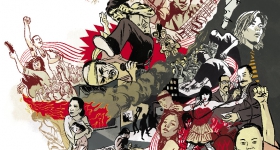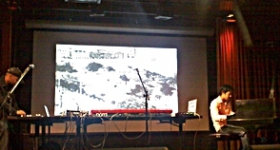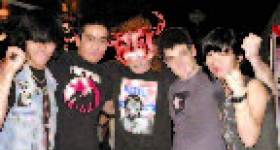PEOPLE WIELDING "Asian radar" can spot every person of Asian descent In any film, band or TV show (and will often gripe about the sparse and terrible nature of Asian American media representation). But even these walking encyclopedias of pop culture can't easily spot every Asian American in the media, especially those who make a name for themselves behind the scenes.
In Hollywood, movie scoring is an unseen yet influential element of the film industry. Musical scores add emotional depth to a viewer's cinematic experience and can become as iconic as the film Itself. Case In point: At any given moment, someone in the world is humming the theme from Jaws or Star Wars.
Movie scores that fall outside the John Williams epic category are perhaps even more underappreciated. Action movie scores in particular can get a bad rap for being simple or too loud.
Hyphen caught up with four Asian American film composers who are raising the bar for action-flick scores. Fueled by superhuman passion, these prolific musicians work maniacal hours under constant deadlines to produce music that soars. For all four composers, musical training began with the piano in childhood and later included some time at the University of Southern California.
Timo Chen, after finishing college at Oberlin College, went on to study Asian music in Asia, where he played in Top 40 bands in hotels and later toured with pop stars Jacky Cheung and Coco Lee. After returning to the states, Chen turned to musical theater, affiliating with the likes of East West Players and filmmaker Chris Tashima. Small movie composing jobs led Chen into the Sundance world, which in turn led to bigger movie gigs. He's done music for Asian Task Force and upcoming sci-fi thriller Afterglow.
Nathan Wang, who started attending university music classes as a child, went to Pomona College and completed graduate work in Oxford, England. Once back in the states, Wang played jazz piano in five-star restaurants and went on to write music for TV's China Beach. Since then, he has composed for a slew of Jackie Chan movies including: Rumble in the Bronx, Who Am I, First Strike and The Myth. George Shaw, a Chinese-Japanese American composer, recently scored Asian Stories starring James Kyson Lee from NBC's Heroes. He has also composed a martial arts-inspired music album called Legendary Warriors and scored an Indiana Jones fan-film called Treasure of the Templars. Shaw aspires to score an epic sci-fi or fantasy movie akin to Star Wars.
Sujin Nam, the sole female composer in this roundup of talent, was born in Seoul, South Korea, and came to the United States for college. Nam, who especially enjoys scoring thrillers, has done musical work for Entrapment, Spider-Man 2 and 3, The Exorcism of Emily Rose, Ghost Rider, Conspiracy, Untraceable, The Grudge and HBO's Mad Men.
Technology and the Action Genre
Despite the classical element in their training, all four composers affirmed the importance of staying technology-savvy.
"The most challenging part of being a composer is to stay on top of all the technological advances that music has made over the years. ... As composers who want to keep working in this business, you've got to stay ahead of, or at least with, the curve," Wang says.
All these technological advances can foster laziness, too. "The easy way is to use a loop and build on top of it," Wang says.
The action-movie genre itself, Chen says, can play into the quick-fix tendency as well. "If you're up against a tight deadline, this is the one genre of music where it can be acceptable to just have filler music that is at full volume, high speed and tons of copy/paste - acceptable, but not desired."
"On the upside," Chen says, "It is the genre where you can actually have soaring epic themes blending in heavy distorted guitars with electronics and drum machines, and have that drive a 100-piece orchestra."
Wang also notes that, despite the use of loops, "good action adventure scores still change with the picture, and there is still a good deal of variety within the score. Someone I love to listen to is Alan Silvestri. His action score for Van Helsing is always changing, is always changing meter and always following the myriad of tension and releases within the action."
Nam sheds further light on the technical and artistic nuances called for by certain movie genres and subgenres. As for fantasies and adventures, "the subject can be seen as artsy, free and thinking-outsidethe-box-like, but actual production should be precisely calculated with technology and technique," she says. On the other hand, "good thrillers are almost like battlefields between the filmmakers and the authence telling one another, 1I am smarter.' But the authence wants to be confused and tricked before things unfold," she says.
Speaking to personal preferences among types of scenes, Chen would rather score "a good chase scene over a fight," because it allows for "the background to always be changing and to have tons of edits at every angle, which gives the composer the option to either tie everything together or to blow It all up."
Chen also likes to "experiment with actually pulling away from on-screen emotion and going the opposite direction entirely" - but he recognizes that there is a limit to the extent that such experiments will fly. "If you go beyond [that threshold]," he says, "you've blown it and are no longer part of the film."
Race and Stereotypes
For the most part, the composers do not identify racism as an issue affecting their work. Or perhaps it's more accurate to say they don't let it affect them.
Shaw emphasizes that success in the field hinges on the tried-and-true method of networking: "It really all comes down to relationships with people."
Wang, who refutes having encountered any discrimination, is simply "glad that Asian Americans are making great strides in all facets of the film industry - in back and in front of the camera."
To the extent stereotyping occurs, Chen says, it can happen among Asian Americans and can even work to one's advantage. Chen recalls that he once landed a gig with an Asian American director who "believed that, being of Chinese descent, I had [probably] been taught the values of frugality and therefore would not go over budget."
Likewise, Nam says, "My Jewish agent still calls me first whenever he finds some Asian-related projects. I welcome it. It never bothered me. Why should It?"
Model minority stereotypes can be especially helpful to Asian Americans in the composing industry, Nam says, given its close ties with the tech industry. And more broadly, "being Asian is often regarded as being smart, hip, fashionable, tech-savvy and even philosophical," Nam says. "I have been enjoying all unproved pre-assumptions [of] me by people I work with."
Nam notes that, beyond racial stereotypes (one composer she met opened conversation with, "I like green tea"), genderrelated assumptions can be a factor in job offers. In this respect, Nam's gender-ambiguous name is an asset. "I have actually gotten a couple movies that the directors assumed that I was male when they heard my demo CDs," she says. "I was chosen among more than 10 different composers each time. It worked out very positively for me."
Contrary to the notion that Asian Americans in the film industry fall into a crabsin-a-bucket mentality, Chen says he gets more job offers for projects featuring Asian Americans or having an Asian American director and/or producer. "For the most part," he says, "we all stick together and it is a fun journey."
Chen notes, too, that other nonracial factors are important in determining job offers. Given the dire state of today's economy, he says, "people are going to see films to either laugh or escape. Therefore there are a lot of comedies and lots of sci-fi and action films." Chen is offered a fair number of drama projects, "but not much drama is getting green-lighted unless there is a message of hope attached with it," he says.
Without dichotomizing "East" and "West" as Asian and American, the composers notice that modern cultural differences among global regions play out in contrasting musical styles and preferences.
"On a mystical Asian period martial arts film," Shaw says, "I would probably use mostly organic, acoustic sounds, with a mix of Asian instrumentation and Western orchestra. But in a futuristic, gritty, high-tech action thriller, I would probably write electronic/techno elements on top of driving rock or orchestral music."
Wang, who feels "very lucky to have worked on both sides of the world," perceives definite differences between countries' film scoring industries. "The Chinese sensitivity to music [requires] that the writing must be very over-the-top," Wang says. In China and Hong Kong, "the music must be noticed to be good, so I must put on my 'un-subtle' hat when I compose for a Chinese movie." By contrast, here in the States, the favored style is "subtle, out of the way of the visual and dialogue."
Work, Life Balance
Nam cautions aspiring music scorers to "think twice about if this is the job for you." Composers have been known to "stay in their studios without going home in order to meet deadlines, neglecting their families," Nam says. "It can cost [you] your relationship."
Wang, on a positive note, embraces the challenge of balancing work and family. "It's a blessed career for me, but I'm also blessed to have a terrific family," he says. "Enjoying the short years of being a father before [my 12-year-old son] goes to college is a cherished thing for me."
By way of advice, Shaw says to newbles wanting to break into the biz: "Watch a lot of different movies in the same genre. ... It helps to see how differently many composers will score a particular type of scene, and to pick up on things you like. Eventually you'll form your own Instincts on how to score that genre."
Nam encourages composers to keep writing and composing music even despite a lack of new projects or current technology. "Share everything you have," she says, and success "will come back to you."
For Chen, such sharing includes "rocke-oke" - "where we bring real instruments to a Rock Band [video game] party at someone's house and actually play the songs for real while the players try to play on Rock Band ... and we usually smoke 'em out."
More seriously, Chen says, "You will find yourself [creatively] blocked every now and then" - but that's no cause for dismay. It just means that "you are now ready for something exciting to come out of your head that you never knew you had inside of you. The bigger the block, the bigger the breakthrough," he says.
The ultimate secret to staying motivated in this grueling industry may be the effervescent attitude expressed by Wang: "I'm lucky to have found my place, and that makes me very, very happy."
Writer Margot Seeto Photo and Illustration Andria Lo and Boon Design
Margot Seeto, Hyphen's new music editor and a San Francisco native, is a freelance writer who lives in Hawaii and works for the Honolulu Weekly.









Comments